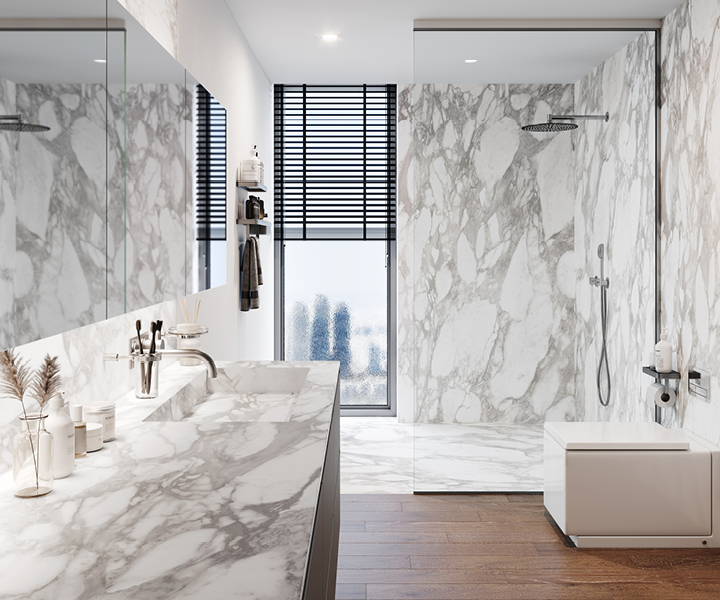
Selecting the right tiles for shower walls is crucial for achieving both aesthetic appeal and practical functionality. What tile is best for shower walls depends on various factors such as durability, maintenance, style preferences, and budget considerations. This article explores different types of tiles commonly used for shower walls, highlighting their unique characteristics, benefits, and considerations.
I. Introduction to Selecting Tiles for Shower Walls
Choosing suitable tiles for shower walls is essential to create a visually stunning and durable bathroom space. Factors such as moisture resistance, ease of maintenance, and design preferences play a significant role in determining the best tile option for shower walls. This article aims to provide insights into various tile choices and considerations to help homeowners make informed decisions.
II. Porcelain Tiles: Durable and Low-maintenance Option
Characteristics and Benefits
Porcelain tiles are renowned for their durability, making them an excellent choice for shower walls. They are resistant to moisture, stains, and scratches, ensuring longevity and easy maintenance. Additionally, porcelain tiles are available in a wide range of colors, patterns, and finishes, offering versatility and design flexibility.
Varieties and Designs
Porcelain tiles come in various sizes, shapes, and designs, allowing homeowners to create customized shower walls that suit their aesthetic preferences. From classic subway tiles to modern geometric patterns, the design possibilities with porcelain tiles are virtually limitless. Additionally, advanced printing technologies can mimic the look of natural stone or wood grain for a luxurious appeal.
Installation Considerations
When installing porcelain tiles on shower walls, it’s essential to use appropriate waterproofing membranes and grouts to prevent water infiltration and mold growth. Professional installation is recommended to ensure proper alignment and sealing of tiles, especially in wet areas. Regular cleaning with mild detergent and occasional resealing can maintain the tiles’ appearance and performance over time.
III. Ceramic Tiles: Versatile and Affordable Choice
Properties and Advantages
Ceramic tiles are a popular choice for shower walls due to their versatility, affordability, and wide availability. They are made from clay and other natural materials, then kiln-fired to create durable and waterproof surfaces. Ceramic tiles are resistant to moisture, stains, and fading, making them suitable for high-moisture areas such as showers.
Style Options and Finishes
Ceramic tiles come in an array of colors, textures, and finishes, allowing homeowners to achieve various design aesthetics in their bathrooms. Glossy finishes reflect light and create a bright, spacious feel, while matte finishes offer a more subtle and sophisticated look. From traditional subway tiles to contemporary geometric patterns, ceramic tiles offer endless design possibilities.
Maintenance and Longevity
Ceramic tiles are relatively easy to clean and maintain, requiring regular sweeping or vacuuming to remove surface dirt and debris. Periodic mopping with a mild detergent solution helps keep the tiles looking fresh and hygienic. While ceramic tiles are durable, they may be prone to chipping or cracking if subjected to heavy impact or improper installation. However, with proper care and maintenance, ceramic tiles can last for many years.
IV. Natural Stone Tiles: Luxurious and Timeless Appeal
Types of Natural Stone Tiles
Natural stone tiles, such as marble, granite, limestone, and travertine, add a touch of luxury and elegance to shower walls. Each type of natural stone offers unique colors, veining patterns, and textures, creating a one-of-a-kind look. While natural stone tiles are inherently porous and require sealing to prevent water damage and staining, they exude timeless beauty and sophistication.
Aesthetic and Textural Qualities
Natural stone tiles lend a sense of warmth, character, and authenticity to shower walls, enhancing the overall ambiance of the bathroom. The natural variations in color, veining, and texture create a visually stunning focal point that elevates the design scheme. From sleek and polished marble to rustic and tumbled travertine, natural stone tiles offer a myriad of aesthetic possibilities.
Sealing and Maintenance Requirements
Due to their porous nature, natural stone tiles require sealing to protect against moisture absorption and staining. Regular sealing and periodic reapplication are necessary to maintain the tiles’ integrity and appearance. Additionally, gentle cleaning with pH-neutral stone cleaners and avoiding harsh chemicals or abrasive cleaners help preserve the natural beauty of stone tiles for years to come.
V. Glass Tiles: Elegant and Reflective Surface
Features and Advantages
Glass tiles are prized for their luminous and reflective qualities, adding a touch of elegance and sophistication to shower walls. They are non-porous and resistant to water, stains, and mold, making them ideal for wet environments like showers. Additionally, glass tiles are available in a wide range of colors, finishes, and sizes, allowing for endless design possibilities.
Design Versatility and Visual Impact
Glass tiles can create stunning visual effects with their translucent properties, reflecting light and adding depth to shower walls. Whether used as accent tiles or covering entire walls, glass tiles make a bold statement and enhance the overall aesthetic of the bathroom. From iridescent mosaic tiles to sleek subway tiles, glass tiles offer versatility and design flexibility.
Installation and Care Tips
Installing glass tiles requires careful attention to detail to ensure proper alignment and adhesion. Professional installation is recommended to achieve flawless results and prevent issues such as uneven spacing or adhesive visible through the tiles. While glass tiles are relatively easy to clean with mild detergent and water, avoiding harsh abrasives or acidic cleaners helps maintain their clarity and shine.
In conclusion, selecting the best tile for shower walls involves considering factors such as durability, maintenance requirements, design preferences, and budget considerations. Whether opting for porcelain tiles, ceramic tiles, natural stone tiles, or glass tiles, each type offers unique characteristics and benefits that contribute to a beautiful and functional bathroom space. By weighing the pros and cons of different tile options and considering individual needs and preferences, homeowners can create shower walls that are both visually stunning and practical for everyday use.





